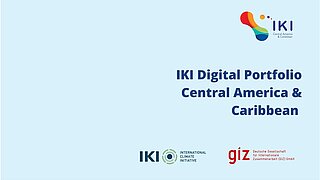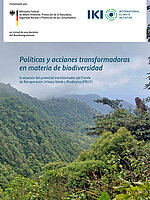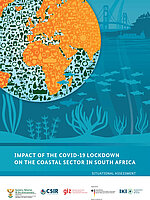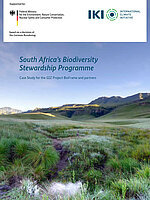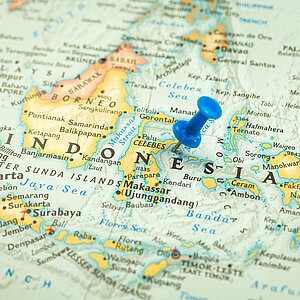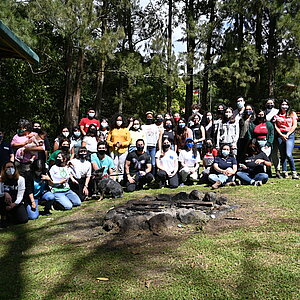Promoting the sharing of knowledge among IKI projects in Central America and the Caribbean

The third Exchange Workshop for IKI projects in Central America and the Caribbean offered a variety of activities to enhance knowledge exchange.
Implementing organizations and partners of 33 IKI projects in Central America and the Caribbean got together in San José, Costa Rica in May to exchange knowledge and lessons learned in the implementation of their projects.
The IKI participated also at the workshop with a delegation of representatives from the Ministry of the Environment, Nature Conservation, Nuclear Safety and Consumer Protection (BMUV), the Ministry of Economic Affairs and Climate Action (BMWK) and the IKI Office at Zukunft-Umwelt-Gesellschaft (ZUG) gGmbH.
“The IKI faces the double crisis of climate change and biodiversity loss in an integral way, as a financing instrument for cooperation projects aimed at the implementation of the objectives of these two conventions: climate change and biodiversity. That is why it is necessary that all actors from the Government, academia, private sector, and society work together”, stated Axel Benemann, senior advisor for the BMUV.
New tools for IKI projects in the region
ACCION Clima, the IKI interface project for the region presented a series of new tools for knowledge dissemination and visibility:
- The regional platform IKI Central America & Caribbean showcases project updates to a wider audience and serves as a repository of knowledge products of ongoing and completed projects in the region.
- The podcast The Countdown to 2050 launched in July 2023 on major streaming platforms- takes listeners on a journey across the region to learn about the impacts of IKI funding.
- The thematic community PANORAMA Mitigation allows IKI projects and their partners around the globe to share successful and replicable solutions in greenhouse gas mitigation.
- The Regional Hub for Climate Innovation aims to develop a coordination and facilitation mechanism for climate-impactful innovation processes in Latin America and the Caribbean.
"With these tools, we hope to offer new channels and means to visualize the impact that our projects have in the region, to share successful experiences and make these easily accessible to the region and beyond", stated Ann-Kathrin Schloenvoigt, coordinator of the IKI interface component at GIZ.
Networking and synergies

The first day of the workshop, there was a focus on strengthening existing connections and creating new ones. Participants took part in a Speed Dating dynamic, which allowed them to quickly circle throughout the room and get to know representatives of IKI, implementing organizations and partners.
Subsequently, projects gathered in groups, with the aim of sharing their priorities and main activities for the upcoming months. The aim was to find synergies among those working on the same topic, in the same country or region, or with similar target groups, that could work as a basis for future collaboration.
“I always look forward to these events, and when you see people staying together at breakfast and the Happy Hour, you can clearly see the need for this interaction. So many good things are happening, and there is going to be a lot of follow-up as people exchange their cards. We will continue this dialogue and keep learning from each other”, said Wiley Barbour, project manager of the Caribbean Cooperative MRV Hub project.
Technical discussion
On the second day, the projects dived into a more technical discussion of selected topics. It started by several projects presenting on their exit strategies as well as main challenges and lessons learned when ending an IKI project. Key messages included co-creating project activities with partners from day 1, anchoring knowledge and capacities in partner institutions after the project’s conclusion, and not leaving the exit strategy for too late.
Further recordings of individual presentations and panel discussion on exit strategies can be accessed here.
This session was followed by group discussion on best practices, challenges, and solutions regarding selected topics relevant to all IKI projects, namely:
- "Leaving No One Behind: Gender Integration, Diversity, and Safeguards in IKI Projects";
- "Monitoring Projects through IKI Action Indicators and Standards";
- "Making Impacts Visible: External Communication of Cooperation Achievements".
More information on the post-group work Talk Show that highlights the results can be accessed here.
From theory to practice

On the last day of the workshop, it was time to take the show on the road - and share with the participants concrete results and impacts of IKI projects in Costa Rica.
How to restore agricultural soil
The first stop was at La Valentina, a livestock farm in Zarcero, Costa Rica. As a result of decades-long flower and strawberry production, the farm’s soils had been heavily contaminated with agrochemicals and pesticides. In 2013, when dairy production was established on the farm, a new soil treatment procedure was introduced: A special organic fertilizer manufactured on the farm out of cheese whey, molasses, sulfates, and photosynthetic bacteria. 15 years later, La Valentina’s soil is one of the best in the region.
Currently, the farm participates in the Recarbonization of Global Soils (RECSOIL) mechanism of the IKI project Support Program to Increase Climate Ambition in Land Use and Agriculture through NDC and National Adaptation Plans (SCALA) of the Food and Agriculture Organization of the United Nations, which certifies Costa Rican livestock and coffee farmers for their effective soil management.
Urban greening projects
Around 60 kilometers southeast of Zarcero, participants visited projects financed by the Green Urban Recovery Fund. This financing mechanism is directed at urban greening projects in the Greater Metropolitan Area. It is implemented by the IKI projects Biodiver_City and BioFrame.
The cooperative Coopecabañas in Santa Ana aims to combine urban development with environmental preservation to improve the quality of life for its community. Their project includes the development of a communal biological corridor, as a first stage of creating an interurban biological corridor. One of the first measures is planting 940 trees of 100 different species. Additionally, the organization has received support in creating an economic sustainability plan for the initiative and receives assistance in its management.
The public park Parque La Libertad in Desamparados integrates good environmental practices in park management. With support of the Green Urban Recovery Fund, a nature trail was created for the 200,000 annual park visitors. It serves as an awareness-raising measure that will provide safe and constructive spaces for recreation as well as capacity building. A nursery provides native trees and shrubs, which will help restore the park’s as well as neighboring interurban biological corridor’s forest landscape.
The link has been copied to the clipboard
Contact
IKI Office
Zukunft – Umwelt – Gesellschaft (ZUG) gGmbH
Stresemannstraße 69-71
10963 Berlin





